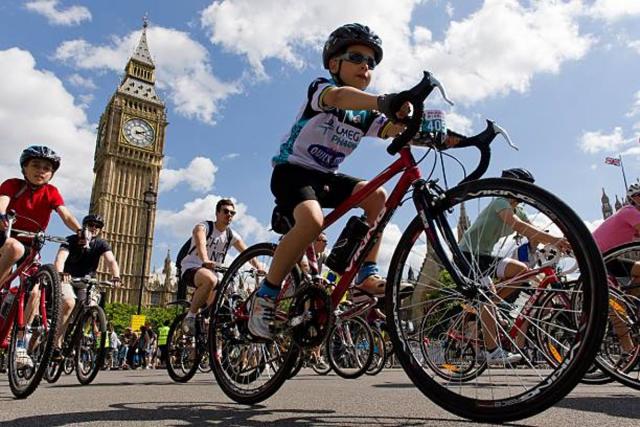OPINION – Our planet faces disaster, but events like RideLondon …

RideLondon’s FreeCycle event is returning to the city this weekend. (AFP via Getty Images)
We are living on borrowed time. Our planet is heating up, the weather[1] is becoming more extreme and we need to find new ways to feed ourselves.
Pollution[2] caused by burning fossil fuels[3], by heating houses without adequate insulation and from cars running on diesel and petrol engines make it harder to breathe in our cities[4]. Air pollution is proven to cause increasing numbers of early deaths.
The sheer scale of the challenges we face in reversing global warming seem too huge, too global and simply impossible for you or me — the everyday person — to make any difference.
But one of my mantras, when facing huge issues, is the old adage: “How do you eat an elephant?” The answer? “One bite at a time.”
And that is what each one of us now needs to do every day in our own lives to help tackle this global issue. Every action we take — however small — every change we make to reduce our emissions and every day we live more thoughtfully is a bite of that elephant.
This weekend we are celebrating the tenth anniversary of RideLondon, the world’s greatest festival of cycling, which was established by the Mayor of London and his agencies as a legacy event from the 2012 Olympic Games.
Since that first edition back in 2013, RideLondon has inspired more than 150,000 people to start cycling or to cycle more often and has raised more than £83 million for charity. It is by far the most successful legacy event from London 2012.
In that decade, cycling has grown hugely in popularity and Transport for London (TfL) and the Mayor of London have worked in partnership with London boroughs to create hundreds of kilometres of new and upgraded cycle routes to encourage and enable Londoners to cycle safely more often.
I now see hundreds or maybe even thousands of cyclists on those routes every day as I ride into the office. However, statistics still show that more than 250,000 journeys of less than a mile every day in London are made by car. That has to change. Swapping just one car journey a day for active travel can reduce your daily carbon footprint by up to 84 per cent.
The Ford RideLondon HUB in Trafalgar Square this weekend will feature Ford’s Park the Car initiative which encourages people to walk or cycle, wherever possible, rather than drive short journeys. The hub will be packed with free entertainment and activities to inspire people to get on a bike and also a giant screen showing live coverage of each day of the RideLondon Classique, the three-day UCI Women’s WorldTour race featuring the world’s top women cyclists.
Ford is serious about reducing carbon emissions and preserving the planet for future generations.
But we need more than electrified vehicles. Sometimes we can use no vehicles at all. Hence the initiative Park the Car — or ride a bike
The centre of London on Sunday will have air that has 90 per cent less nitrogen dioxide than normal. It will be traffic-free and a joyful place to visit. Either bring your bike or hop on to a Santander Cycles bike and experience RideLondon FreeCycle[5], eight miles of traffic-free roads in our great capital.
This is the world we can create together for the future, a world where our planet and our bodies can breathe more easily.
References
- ^ weather (www.standard.co.uk)
- ^ Pollution (www.standard.co.uk)
- ^ fossil fuels (www.standard.co.uk)
- ^ cities (www.standard.co.uk)
- ^ RideLondon FreeCycle (www.ridelondon.co.uk)